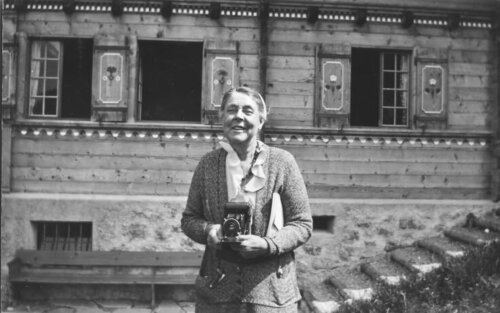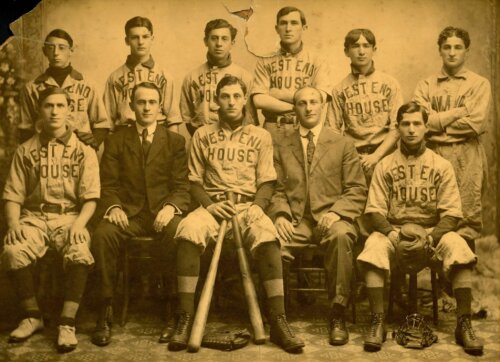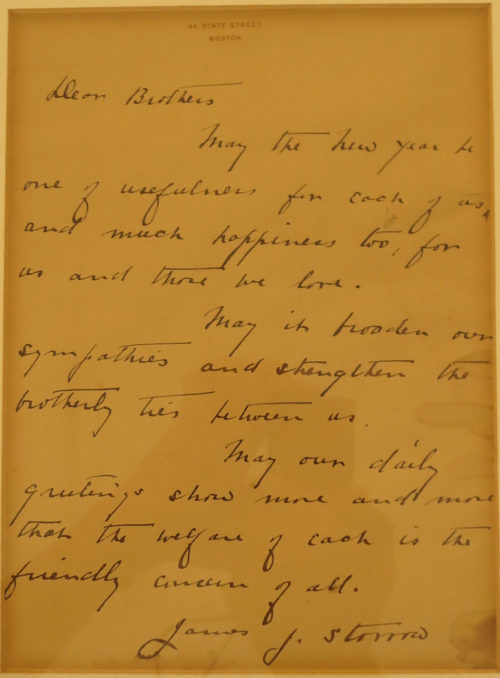Helen Osborne & James Jackson Storrow: West End Benefactors
Helen Osborne Storrow (1864-1944) and James Jackson Storrow (1864-1926) were influential Bostonian philanthropists. Much of their work had a lasting impact on the West End, especially through their support of the West End House, Charles River Basin development, and Saturday Evening Girls’ club.
James Jackson Storrow was born to a prominent family in Boston in 1864. Following family tradition, James graduated from Harvard College and Harvard Law School. After twelve years as a successful attorney at Fish, Richardson & Storrow, he became a partner at the Lee, Higginson & Co. banking house. James helped organize the Boys Clubs of America in 1906 and became President of the Boy Scouts of America in 1925. During the first decade of the 20th century, James was elected to the Boston City Council and Boston School Committee. On the School Committee, he challenged the use of corporal punishment.
Between 1900 to 1910, James played a vital role in transforming the Charles River from an unhealthy creek into a majestic basin for boating and recreation. From 1906 to his death in 1926, James took an active role in the West End House Boys’ Club. In 1906 he rented 9 Eaton Street for the club and built a new summer camp in East Parsonfield, Maine. Soon, hundreds of West End boys enjoyed summer vacations at the West End House Camp on Long Lake. James’s will set up a permanent endowment for the West End House and funds for a new clubhouse on Blossom Street. Throughout it all, James gave generously of himself. While on the School Committee, he held evening office hours at his job for neighborhood boys, giving them “individual and unhurried attention.” He covered school expenses for many students on the condition of anonymity.
Philanthropist Helen Osborne Storrow (1864-1944) shared her husband James Jackson Storrow’s enthusiasm for the West End Boys’ Club and the Charles River Basin development. Following his death in 1926, Helen and their son James J. Storrow, Jr. contributed $100,000 to both the West End endowment and the Blossom Street building funds. Helen also honored her husband with a $1,000,000 donation to the Charles River Basin project.
Helen also championed girls’ development. She provided critical funds for Boston’s Saturday Evening Girls’ club (S.E.G.). Frustrated by Boston’s lack of educational, economic, and social support for working-class women, in 1899 Boston librarian Edith Guerrier and the artist Edith Brown founded a “library club” for poor, young Jewish and Italian women in Boston’s North End. Guerrier and Brown convinced Helen to fund S.E.G. operations. From its beginning as a single-story hour on Saturday evenings, S.E.G. expanded to eight library clubs, each tailored for young women of different age groups. At its peak in the mid-1910s, S.E.G. had 250 members and operated the Paul Revere Pottery. While Helen passed away in 1944, her and her husband’s work survives today at the West End House and through the continued recreational use and enjoyment of the Charles River.
Article by Nancy Dennis, edited by Grace Clipson.
Sources: Daily Boston Globe, “Mrs. Storrow’s Death Mourned by Thousands,” November 12, 1944; Kate Clifford Larson, “The Saturday Evening Girls: A Progressive Era Library Club and the Intellectual Life of Working Class and Immigrant Girls in Turn-of-the-Century Boston,” The Library Quarterly: Information, Community, Policy 71, no. 2 (2001): 195–230; New York Times, “James J. Storrow, Noted Banker, Dies: Head of Lee, Higginson & Co. of Boston Succumbs to Illness in Hotel here. A Leader in Good Causes (President of Boy Scouts — as Chairman of Nash Motors Put Company on Road to Prosperity,” Mar 14, 1926; New York Times, “Mrs. Storrow Dies, Girl Scout Leaders: Widow of Boston Banker Was Active in Growth of Group in this Country and Abroad,” November 12, 1944; New York Times, “Storrow Becomes Second President of Boy Scouts: Boston Banker Succeeds Colin H. Livingston, Who Retires After Fifteen Years — New Grading System for Scouts,” June 7, 1925; New York Times, “Storrow Left $16,250,000: Boston Banker’s Will Is Allowed in Probate Court,” April 7, 1926; New York Times, “Want New England Group: Spokesmen for the Region Favor One Big Railroad Corporation,” January 10, 1924; Henry Greenleaf Pearson, Son of New England: James Jackson Storrow, 1864-1926 (Boston: Thomas Todd Printers, 1936); Anthony M. Sammarco, and Community Boating, Inc, Images of America: Community Boating, Inc (Charleston, SC: Arcadia Publishing, 2018); Reed Ueda, West End House, 1906-1981 (Boston: West End House, 1981); W.R. Waterman, “[Review] Son of New England. James Jackson Storrow, 1864-1926 by Henry Greenleaf Pearson,” The Mississippi Valley Historical Review 20, no. 1 (1933): 139–40.












